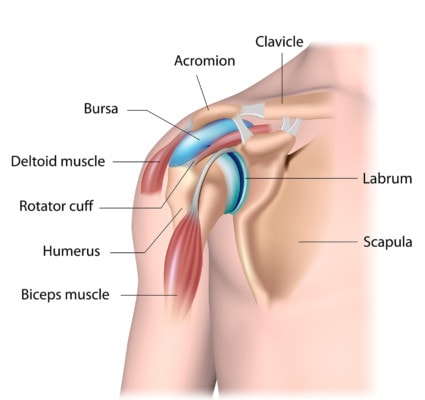Shoulder Labrum Surgery Recovery: How Successful is Shoulder Labrum Surgery?

Alila Medical Media/Shutterstock
Operating on a torn shoulder labrum is a big deal and shoulder labrum surgery recovery is foremost in the minds of patients. How quick can I get back to sports after a shoulder labrum surgery? Can I expect to be healed after an operation to fix a torn shoulder labrum? Backing up a bit, does the medical research even show that shoulder labrum surgeries work well? The answer to that last question is, “not so much”.
Two recent research studies aren’t all that encouraging that surgery for a torn labrum works that well in most patients. First, you had better be young if you want the surgery to be successful. One study looked at 225 shoulder patients that underwent surgery for type 2 SLAP tears. Patients over the age of 36 were three and a half times (345%) more likely to have a failed surgery! Yikes, most of the patients that we see for stem cell injections to help heal these tears are in their 40’s and 50s, not in their early thirties. A second recent study looked at the outcome of nearly 5,000 surgeries. Only about 1 in 4 patients actually had no pain after the surgery and only 4 in 10 said that the surgery was a resounding success. Even worse, just a bit more than 1 in 10 patients said that their function was normal after the surgery. Even more concerning was that the average age of this group of patients was fairly young (36 for men and 41 for women). Since the study had many more men than women (78% men), this should be the group that’s responding well to this surgery.
The upshot? Most patients believe that surgery for a torn labrum is like getting a broken part replaced in their car. However, the data shows that if you want a good result, you had better be young. In addition, not many patients are reporting that their results were great or that they have no pain or normal function after this invasive surgery.

NOTE: This blog post provides general information to help the reader better understand regenerative medicine, musculoskeletal health, and related subjects. All content provided in this blog, website, or any linked materials, including text, graphics, images, patient profiles, outcomes, and information, are not intended and should not be considered or used as a substitute for medical advice, diagnosis, or treatment. Please always consult with a professional and certified healthcare provider to discuss if a treatment is right for you.
